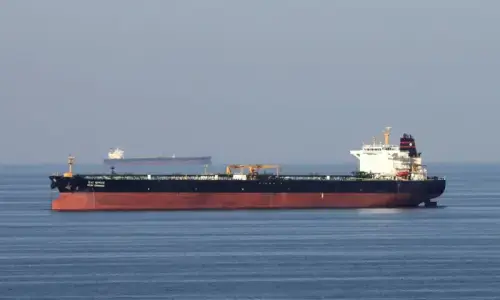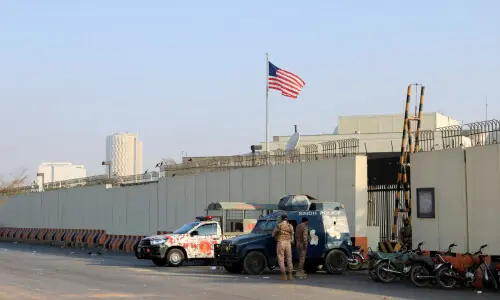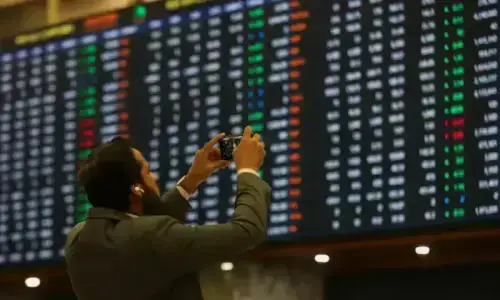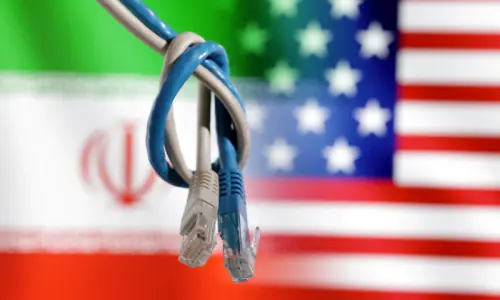LESS than two years ago, Pakistan’s economy was being celebrated for being dynamic, resilient, and on a path to high, sustainable, growth. Numerous international journals and newspapers — always critical of Pakistan’s economic management and governance — were waxing lyrical about the prospects for Pakistan’s economy after almost a decade of struggling.
The last fiscal year, which ended in June 2018, saw Pakistan’s highest GDP growth in 13 years. Moreover, from 2013 to 2018, the growth rate increased every year, a phenomenon not seen in Pakistan for quite some time; other than the fake ‘boom’ under Gen Musharraf, which was based on, and further resulted in, gross irrational speculation in real estate and stock market prices. The Musharraf bubble in all its manifestations — cultural, economic, political — eventually broke to reveal its false foundations.
Today, the story is very different. The expected growth rate for the current fiscal year has been lowered to near three per cent, the lowest in nine years, and is expected to be lower still in the subsequent two years. Inflation has started rising again, to levels not seen for the last five years, and the rupee is worth a third less in the international market compared to what it was just a year or so ago. With lower development expenditure and lower projections for manufacturing growth, all accounts suggest that Pakistan’s economy is facing a serious crisis. However, this crisis has not been caused as much by fundamentals, as by complacency, incompetence, and utter mismanagement by the incumbent government.
The PTI government inherited an economy with the highest growth rate in 13 years, albeit strains were more than evident, especially regarding the current account and fiscal deficits. The rupee had been linked to a former finance minister’s irrational ego for far too long, and would have had to give at some point. Moreover, it was also fairly clear that if the previous government of the PML-N was re-elected, it would most certainly have gone to the IMF within days of taking office.
Read more: Why Pakistan will go to the IMF again, and again and again
This was also expected from the party which eventually won, despite their public bravado of claims to the contrary. Whatever views any economist held about the Fund, it was clear that Pakistan was on the verge of yet another IMF programme.
The hallmark of PTI’s economic plan in the last five months has been continued uncertainty & ambiguity.
This so-called crisis which has taken place affecting Pakistan’s economy rests unambiguously on the shoulders of the finance and economic team managing the economy since August 2018, and especially on Pakistan’s finance minister. Decisions needed to be made immediately after taking office and a direction to addressing real and perceived, as well as potential problems, needed to be developed urgently. All that one has seen since the PTI government took over is a failure to understand how Pakistan’s economy works, what the key issues and problems are, and how they are to be addressed.
The hallmark of PTI’s economic programme in the last five months has been continued uncertainty and ambiguity. As anyone familiar with understanding how economies work would know, the core of all ills regarding economic planning and thinking is a government which has no clue about what to do about the economy, and hence, its chronic uncertainty.
The PTI economic team reflects such sentiments better than most governments in Pakistan’s recent history. Even if one disagrees with the politics of a particular political party, governments in the past have always put in a plan about what they want to do with the economy. Not all plans have worked, but market sentiment and investors have had some guidelines about what to expect in terms of direction, management and policy. Since last August, this has clearly not been the case as reflected in all markers of investor sentiment and confidence. Even international agencies have had to downgrade Pakistan’s economy’s ratings on how the economy has been managed.
Other than asking its three ‘friendly’ countries for desperate loans and deposits, there seems to be no policy, leave alone a vision, regarding Pakistan’s economy. Although the government celebrates a handful of dollars deposited with the State Bank of Pakistan by two countries, this is akin to giving someone who is completely broke and destitute and insolvent some money for safekeeping, so that they can try and look good, but are in no position to spend or use that money since it needs to be paid back and, that too, with interest.
Pakistan’s accounting books might look good for a few months because of money loaned to it, but these sums will need to be paid back. A loan is not a grant. And claiming that there are no conditions attached — whether political or military — to these loans, is naiveté of the highest order, a point raised by a senior member of Pakistan’s Senate.
Furthermore, while aggressive selective accountability against some political opponents might bring some cheer from the PTI faithful, this is bound to have negative consequences on economic activity in the short run with potential investors far more circumspect.
By saying that we may go to the IMF, or that we may not, or that we no longer need the IMF, the finance minister is stoking the already raging fires of uncertainty regarding Pakistan’s economy. He is fully entitled to opt out of an IMF straitjacket but needs to present a viable option of how he is going to address the growing strains in the economy. His double- or triple-speak, is clearly a reflection of his confusion and inability to find alternatives to bridge the foreign finance gap. The more he procrastinates, the more the damage done. And if by chance, he has found a magic wand which will rescue Pakistan from an inhospitable IMF programme, the sooner he waves it to end this uncertainty, the better.
The writer is a Karachi-based political economist.
Published in Dawn, December 31st, 2018































